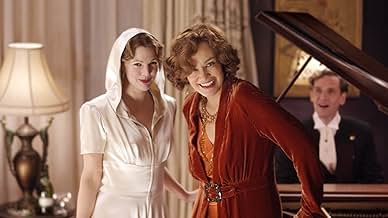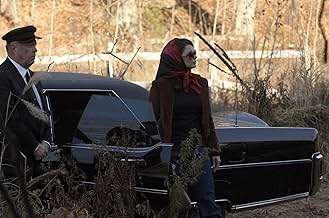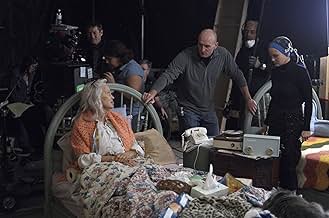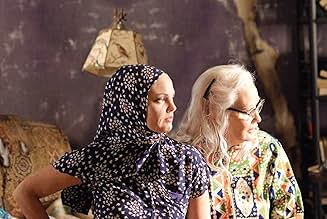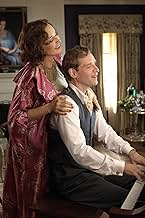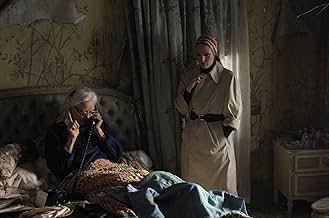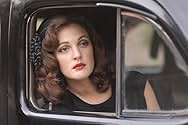The lives of Edith Bouvier Beale and her daughter Edith, aunt and cousin of Jacqueline Kennedy Onassis Onassis.The lives of Edith Bouvier Beale and her daughter Edith, aunt and cousin of Jacqueline Kennedy Onassis Onassis.The lives of Edith Bouvier Beale and her daughter Edith, aunt and cousin of Jacqueline Kennedy Onassis Onassis.
- Director
- Writers
- Stars
- Won 6 Primetime Emmys
- 36 wins & 33 nominations total
Louis Ferreira
- David Maysles
- (as Justin Louis)
Louis Grise
- Young Buddy
- (as Louis Grisé)
- Director
- Writers
- All cast & crew
- Production, box office & more at IMDbPro
7.411.7K
1
2
3
4
5
6
7
8
9
10
Featured reviews
Deeply Moving, The film QUIVERS with FEELING
I remember vividly walking through the living room one day in the late 90's when my roommate was chuckling at the documentary GREY GARDENS on the Sundance channel. My eye immediately caught the images of Big and Little Edie in the yellow room and I became involved watching it too. Something about this little documentary just drew me into it. Yes, it was funny, but the humor was also mixed with feelings of horror and pity. I remember feeling a bit uneasy watching these women. One confined to an uncomfortable bed and the other confined to her shattered dreams of unrealized stardom. Both seemingly stuck in a dilapidated house in bad need of repair. What I find beautiful about the documentary is how it questions ones own perception on what "wealth" is. The documentary has that "never judge a book by it's cover" / "things are never quite what they seem" aspect to it. The greatness of the documentary is the message that "real" wealth in life comes in different forms, not just perceived material possessions. The outside doesn't necessarily reflect what's going on beneath the surface. After several viewings of the documentary, it's impossible to have pity for big and little Edie. They had wealth where it counted, in humor, intelligence, feeling, character and for each other.
GREY GARDENS with Drew Barrymore and Jessica Lange is a beautiful and deeply moving tribute to a couple of women whose lives might have been forgotten if it weren't for a couple of documentary filmmakers. Handsomely directed and paced by Michael Sucsy, the film resonates so many feelings that only the hardened will not be moved.
At times it is difficult not to compare and judge the performances of Lange and Barrymore with the real Big and Little Edie Beale, especially for those of us overly familiar with the documentary. Oddly enough some of the best scenes in the film are in the early years. If in moments Lange and Barrymore fail to completely live up to an exact interpretation of the Beales, they immediately redeem themselves with the conviction, understanding and love they have for the women and the material. The performances by Lange, Barrymore and Jeanne Tripplehorn will move and surprise you. The film honors, respects and celebrates it's subjects and like the documentary, it touches something deep down.
It reminds all of us that wealth comes in different forms and that true wealth is the loyalty two people can have for each other.
GREY GARDENS with Drew Barrymore and Jessica Lange is a beautiful and deeply moving tribute to a couple of women whose lives might have been forgotten if it weren't for a couple of documentary filmmakers. Handsomely directed and paced by Michael Sucsy, the film resonates so many feelings that only the hardened will not be moved.
At times it is difficult not to compare and judge the performances of Lange and Barrymore with the real Big and Little Edie Beale, especially for those of us overly familiar with the documentary. Oddly enough some of the best scenes in the film are in the early years. If in moments Lange and Barrymore fail to completely live up to an exact interpretation of the Beales, they immediately redeem themselves with the conviction, understanding and love they have for the women and the material. The performances by Lange, Barrymore and Jeanne Tripplehorn will move and surprise you. The film honors, respects and celebrates it's subjects and like the documentary, it touches something deep down.
It reminds all of us that wealth comes in different forms and that true wealth is the loyalty two people can have for each other.
Drew Barrymore and Jessica Lange are so good it is SCARY!
I have NEVER publicly commented on a feature performance until now. Having seen the 1975 documentary about Edith and Edie Beale, I was absolutely blown away by the exacting performances--especially Drew Barrymore. I noticed a few comments dissing the film and it's rather obvious these people don't know the storyline. Jessica and Drew WERE their characters to perfection--a not-so-trivial accomplishment. I knew Lange could act but Drew perhaps has certainly lived up to her family lineage!!! ! Take it for what it's worth: this is a non-fiction account of a most dysfunctional family, parental control, character disorders, being a victim, and reluctant realization of unfulfilled dreams. Little Edie, with all her psychiatric shades, is accurately portrayed by Drew Barrymore. Jessica Lange as the spoiled, controlling mother, sort of sums it all up by telling her daughter that she's not easily likable or attractive with "...Edie ... you are more of an acquired taste". Yet, the bizarre paradox of their relationship is simple. Edie is filled with too much fear to go out into the world and the two really need each other. Call it pathological complementarity. This film works at every level!
I just wish little Edie could have seen this film...
Not sure why it took me so long to view this film (I rarely watch made-for-cable-television films, so that explains that.) I've seen the documentary a number of times and always came away from it wishing I would have had the opportunity to meet the Edies and, particularly, little Edie. I can't explain it, but there's just something so marvelously endearing about her. She should have been a "somebody" other than just being Jackie O.'s cousin.
Watching the 1975 Maysles record of the closing days of Grey Gardens always sets me to thinking, perhaps too much, about what I saw play out between my own deceased mother and grandmother. It always takes me a couple of days to shake that film loose.
I watched the documentary, again, three days ago. Tonight I watched the film--is there a genre known as augmented documentary? The augmented documentary floored me. In particular, Barrymore's performance is stunning. She IS little Edie! I know the documentary very well, all the "classic" lines; and, Barrymore's delivery of them was like...well, watching little Edie in the documentary. Yet, seeing more of the Beales' past played out in rich detail connected so many dots for me (e.g. the very special gift given to Edith by Krug that figures prominently at the film's end.)
At the film's end, I was sorely missing my mother. She was the little Edie in my life; and, she would have loved this film. My grandmother, or big Edie, would have loved it, too. Thankfully, furniture covered with plastic and strict rules about animals in the house (never cats, and only the occasional small dog not allowed in bedrooms) kept the living arrangement tidy; but, the big Edie and little Edie dynamic was all there. So much laughter, so many tears, so much love and so much dislike. This film captured it all for me. Perhaps, to really appreciate it, one needs to have lived it to a certain degree. If one hasn't, I can see where the film might come across less than excellent.
9/10 stars from me and only because the film didn't incorporate "The Marble Faun" eating corn with big Edie; and, I missed little Edit remarking on her "revolutionary" dress for the day.
Watching the 1975 Maysles record of the closing days of Grey Gardens always sets me to thinking, perhaps too much, about what I saw play out between my own deceased mother and grandmother. It always takes me a couple of days to shake that film loose.
I watched the documentary, again, three days ago. Tonight I watched the film--is there a genre known as augmented documentary? The augmented documentary floored me. In particular, Barrymore's performance is stunning. She IS little Edie! I know the documentary very well, all the "classic" lines; and, Barrymore's delivery of them was like...well, watching little Edie in the documentary. Yet, seeing more of the Beales' past played out in rich detail connected so many dots for me (e.g. the very special gift given to Edith by Krug that figures prominently at the film's end.)
At the film's end, I was sorely missing my mother. She was the little Edie in my life; and, she would have loved this film. My grandmother, or big Edie, would have loved it, too. Thankfully, furniture covered with plastic and strict rules about animals in the house (never cats, and only the occasional small dog not allowed in bedrooms) kept the living arrangement tidy; but, the big Edie and little Edie dynamic was all there. So much laughter, so many tears, so much love and so much dislike. This film captured it all for me. Perhaps, to really appreciate it, one needs to have lived it to a certain degree. If one hasn't, I can see where the film might come across less than excellent.
9/10 stars from me and only because the film didn't incorporate "The Marble Faun" eating corn with big Edie; and, I missed little Edit remarking on her "revolutionary" dress for the day.
"A completely priceless life..."
Playing the squalor-ridden, self-deluded Edith 'Little Edie' Bouvier Beale, Drew Barrymore is a revelation. In this dramatization of events surrounding the filming of the 1975 cult documentary "Grey Gardens", Jessica Lange's Edith, Sr. and Barrymore's Edie have a marvelous rapport as high society mother and daughter who fall on financial hard times. Cousins of Jacqueline Kennedy, the Beales--tucked away for years in a seaside house in East Hampton, New York--were a portrait-perfect example of missed opportunities, squandered dreams, and a freaky sort of lazy optimism that bordered on ridiculousness. They let their water and power lapse, their animal-infested home rot away, until cousin Jacqueline came to their rescue in 1971 and helped to fix the place up (and save the twosome from eviction). Lange withers away in frighteningly real fashion, while flirtatious Barrymore carries on as if every day is New Year's Eve. Both performances are spot on, though this is certainly Drew's shining moment as a serious actress; nailing the cadence of Edie's voice, her slouch and boxy walk, not to mention her high-on-life spirit, Barrymore is very funny and touching. The film goes back in time to give us a peek at how the Beale women managed to get to such a low point in life, and while the narrative is condensed and at times restricting, the pacing of the cable-made film seldom lags (as the original documentary did). It's a thoughtful movie about dreams so easily dashed, and the unforgiving price we pay for living in the past.
Filling in the missing pieces in this bittersweet tale of love and loss
The psychological exploration of the Maysles' film of Grey Gardens was riveting, disturbing, entertaining, but ultimately confusing. Who in the world were these colorful-sad women, living in genuinely shocking conditions. Were they mentally ill--was it a put-on--there were so many missing pieces--that those of us who saw the film in the 70s have always remembered this strange sad tale--a sort of benign "Whatever Happened to Baby Jane" kind of tale of lost souls--lost to the world, lost in their own memories and (to us) bizarre fantasy world.
The HBO film fills in many of the pieces--with heartbreaking detail. Jessica Lange and Drew Barrymore are nothing short of astonishing in their reincarnation of this tragic mother and daughter duo. We see their elegance, their fragility, the tricks that life played on them--with vivid detail. The easy fluidity between the past and the present makes for a riveting drama that resonates almost as much as the original documentary. But there is a difference--in the documentary, there was much more humor--Big Edie and Little Edie were characters, and you felt sorry for them--yet you really noticed their resilience and delight at life. Yes they were caught up in the past with their obsessive dwelling on events from that distant golden age of their's--but they also seemed to relish their relationship, their day-to-day coping, their ice cream, their animals--it was really not THAT sad! The movie is much more heartbreaking--because we see the glamorous lives they led--and the contrast with the emptiness of their final denouement in Grey Gardens feels overwhelmingly sad. We suspected that especially Little Edie was mentally ill in the original--delusional--paranoid. In the film, there is no doubt. She was helpless from the beginning.
Pieces have been filled in--but there are still empty pieces that abound--the role Little Edie's brothers had or didn't have in their lives, how the wealthy relatives so completely ignored or were unaware of their living conditions--why the Edies so completely retreated from the "real world" when people with much more heartbreaking situations (and much less of a moneyed background) can not only cope but overcome---these are all still mysteries which will probably never be answered--can only be speculated upon--and which will allow "Grey Gardens"--both the documentary, and now the film--to retain an enduring mystique and fascination.
The HBO film fills in many of the pieces--with heartbreaking detail. Jessica Lange and Drew Barrymore are nothing short of astonishing in their reincarnation of this tragic mother and daughter duo. We see their elegance, their fragility, the tricks that life played on them--with vivid detail. The easy fluidity between the past and the present makes for a riveting drama that resonates almost as much as the original documentary. But there is a difference--in the documentary, there was much more humor--Big Edie and Little Edie were characters, and you felt sorry for them--yet you really noticed their resilience and delight at life. Yes they were caught up in the past with their obsessive dwelling on events from that distant golden age of their's--but they also seemed to relish their relationship, their day-to-day coping, their ice cream, their animals--it was really not THAT sad! The movie is much more heartbreaking--because we see the glamorous lives they led--and the contrast with the emptiness of their final denouement in Grey Gardens feels overwhelmingly sad. We suspected that especially Little Edie was mentally ill in the original--delusional--paranoid. In the film, there is no doubt. She was helpless from the beginning.
Pieces have been filled in--but there are still empty pieces that abound--the role Little Edie's brothers had or didn't have in their lives, how the wealthy relatives so completely ignored or were unaware of their living conditions--why the Edies so completely retreated from the "real world" when people with much more heartbreaking situations (and much less of a moneyed background) can not only cope but overcome---these are all still mysteries which will probably never be answered--can only be speculated upon--and which will allow "Grey Gardens"--both the documentary, and now the film--to retain an enduring mystique and fascination.
Did you know
- TriviaIn the original Grey Gardens (1975), David Maysles asked Edith 'Little Edie' Bouvier Beale who she would want to portray her mother, Edith Bouvier Beale, if a movie based on Grey Gardens were made. She suggested Ethel Barrymore, Drew Barrymore's great-aunt, who died in 1959.
- Quotes
Phelan Beale: Damn Ganymede.
George 'Gould' Strong: I'm right here Phelan, I can hear you!
- Crazy creditsAt the end of the credits, where the American Humane Society's traditional credit is displayed, Little Edie's voice adds "No animals were harmed in the making of this movie."
- SoundtracksTea For Two
from the musical "No No Nanette"
Lyrics by Irving Caesar
Music by Vincent Youmans
Performed by Drew Barrymore and Jessica Lange
Details
- Release date
- Country of origin
- Official site
- Language
- Also known as
- 灰色花園
- Filming locations
- Production companies
- See more company credits at IMDbPro
Box office
- Budget
- $12,000,000 (estimated)
- Runtime
- 1h 44m(104 min)
- Color
- Sound mix
- Aspect ratio
- 1.78 : 1
Contribute to this page
Suggest an edit or add missing content





